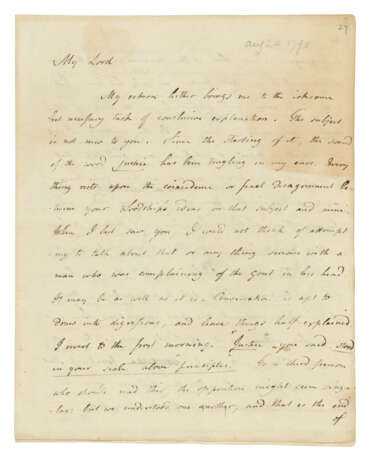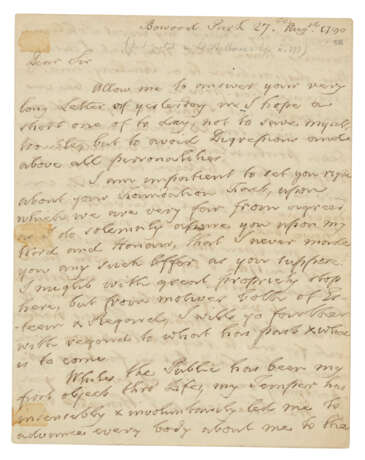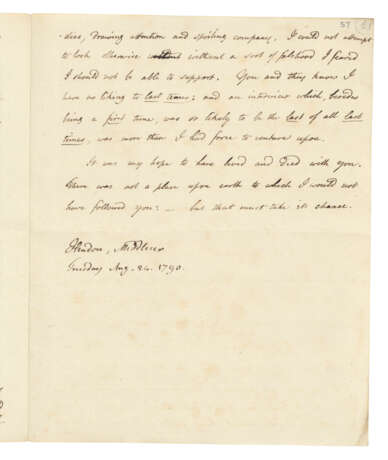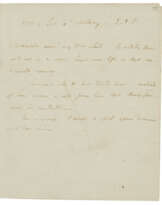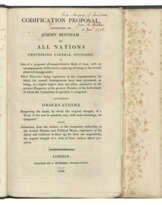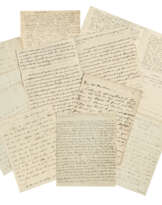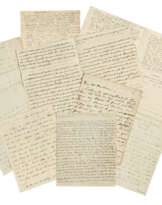ID 1249829
Lot 47 | Jeremy Bentham (1748-1832)
Valeur estimée
£ 4 000 – 6 000
Autograph letter to [William Petty, 1st Marquess of Lansdowne] (‘My Lord’), Hendon, Middlesex, ‘Tuesday’ 24 August 1790
61 pages, 234 x 185mm, on 15 bifolia and a singleton, Shelburne pagination. Provenance: Marquesses of Lansdowne; their sale, Christie’s, Bowood House sale, 12 October 1994, lot 3.
‘The spirits you see now are but the dregs of those you might have given me’: a 61-page, 10,000-word autograph letter expressing violent emotions, a revealing essay of bitter complaint against Lord Lansdowne, whom Bentham regards as one of his closest friends, for failing to advance his political career. Detailing his political ambitions, disappointment at not having been offered a promised seat in Parliament, stressing his reputation, ability and friendship for Lansdowne, complaining that men of inferior ability were being brought into the Commons as members for ‘pocket-boroughs’ controlled by the Marquess, while nothing was being done for Bentham. After stressing at length various implied promises of a seat in Parliament made to him by Lord Lansdowne, Bentham writes: ‘Lucrative things I have never begged of you, because if I had wanted money I should not have given up business, because it has never happened to me to be distressed, because it has never happened to me to covet anything of that sort, nor do I know any thing of that sort that I should think it worth while to purchase at that price. The only thing I have coveted for these many years has been the opportunity of trying whether I could make myself of any use to the country and to mankind in the track of legislation; or not to frighten you with a word which you may not suppose to be in my vocabulary synonymous to wild project and regeneration parliamentary business […] To come to something that shall be intelligible at least give me leave to dispose of the word justice and put in the room of it what you will understand by the word politics […] Let principles then, affection, real justice, every thing vanish before politics: be it so: provided that at this price politics can be seen to derive the smallest chance of compassing its object’. Later, he continues ‘Of my own chance of turning out capable of doing any thing in Parliament I shall say little here: though I could find a good deal to say on that chapter, had I any right to suppose it would be thought worth you hearing. Faculties depend upon spirits: spirits depend upon situation. They do so in most men: they do so particularly in me. The spirits you see now are but the dregs of those you might have given me’. Ending the letter, he remembers ‘When I was last with you, you wanted me to stay. You pressed me with a degree of earnestness I have scarce ever witnessed in you […] it hurt me cruelly to break from you […] It was my hope to have lived and died with you. There was not a place upon earth to which I would not have followed you:- but that must take its chance…’.
‘In a sixty-one page, ten-thousand-word letter, [Bentham] accused Shelburne of bad faith, breaking promises, refusing to practise the principles of reform he preached, and patronizing ingrate mediocrities. This letter is extraordinary not only as a revelation of violent passions that Bentham usually kept hidden, but as a political confession […] Convinced that he alone shared Shelburne’s deepest liberal opinions, he offered to represent them faithfully in Parliament, unlike the Earl’s conservative nominees, who went their own way on divisions and betrayed their trust’ (M.P. Mack, Jeremy Bentham, an Odyssey of Ideas (1962), pp.391-2)
[sold with:]
William Petty, 1st Marquess of Lansdowne (1737-1805). Autograph letter signed (‘Lansdowne’) to Jeremy Bentham (‘Dear Sir’), Bowood Park, 27 August 1790
Nine pages, 238 x 189mm, two bifolia and a singleton.
Lansdowne’s appeasing reply. Explaining that he had been totally unaware of Bentham’s political ambitions: ‘I do solemnly assure you upon my Word and Honour, that I never made you any such offer as you suppose […] I am now only afraid that you will be angry, that your sixty-one pages have not on the one hand had the effect of subduing or terrifying me, or on the other hand made me angry, and that you may apprehend them to be thrown away. They have not occasion’d me one moments irritation – but they are nor thrown away – I select with satisfaction, the Seeds of Esteem and Regard which I perceive interspersed…’.
| Artiste: | Jeremy Bentham (1748 - 1832) |
|---|---|
| Lieu d'origine: | Angleterre, Europe du Nord, Europe, Royaume-Uni |
| Catégorie maison de vente aux enchères: | Lettres, documents et manuscrits, Livres et manuscrits |
| Artiste: | Jeremy Bentham (1748 - 1832) |
|---|---|
| Lieu d'origine: | Angleterre, Europe du Nord, Europe, Royaume-Uni |
| Catégorie maison de vente aux enchères: | Lettres, documents et manuscrits, Livres et manuscrits |
| Adresse de l'enchère |
CHRISTIE'S 8 King Street, St. James's SW1Y 6QT London Royaume-Uni | |
|---|---|---|
| Aperçu |
| |
| Téléphone | +44 (0)20 7839 9060 | |
| Commission | see on Website | |
| Conditions d'utilisation | Conditions d'utilisation |
